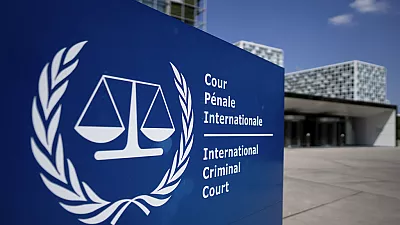The International Criminal Court unsealed war crimes arrest warrants for 6 Libyan suspects
3 min read

The International Criminal Court (ICC) has unveiled arrest warrants for six individuals allegedly connected to a notorious militia in Libya, accused of perpetrating a range of war crimes, including murder and torture. This development comes in the wake of the discovery of mass graves in the western town of Tarhunah in 2020, a location significant for its strategic importance in the ongoing conflict in Libya.
Since the NATO-backed uprising that overthrew longtime dictator Moammar Gadhafi in 2011, Libya has been mired in political chaos. The country is now divided between rival governments in the east and west, each supported by various militias and foreign powers. The political instability has allowed numerous armed groups to operate with impunity, often engaging in violent confrontations and human rights abuses.
ICC Prosecutor Karim Khan revealed that the investigation has amassed substantial evidence indicating that the residents of Tarhunah have suffered numerous crimes that constitute war crimes. These allegations include murder, torture, sexual violence, and outrages upon personal dignity. The gravity of these accusations highlights the severe human rights violations taking place amid the ongoing conflict.
The ICC has issued warrants for six men: Abdelrahim al-Kani, Makhlouf Douma, Nasser al-Lahsa, Mohammed Salheen, Abdelbari al-Shaqaqi, and Fathi al-Zinkal. According to Khan, three of these suspects are leaders or senior members of the Al Kaniyat militia, which dominated Tarhunah from at least 2015 until June 2020. The other three individuals are Libyan security officials who were associated with the militia during the time of the alleged offenses.
The warrants for four of the suspects were initially issued in April 2023, while the remaining two were issued in July of the same year. However, these warrants were kept sealed until now. Khan stated, “It is now my view that arrest and surrender can be achieved most effectively through the unsealing of these warrants.” This decision aims to facilitate the apprehension of the suspects and bring them to justice for their alleged crimes.
The discovery of mass graves in Tarhunah occurred after the militia’s withdrawal, which followed the collapse of a lengthy military campaign led by commander Khalifa Hifter. Hifter attempted to seize control of Tripoli from various militias that were aligned with the former U.N.-recognized government. The presence of mass graves underscores the brutality of the conflict and the scale of human suffering experienced by local communities.
It is crucial to note that the ICC lacks its own police force and depends heavily on the cooperation of its 124 member states to enforce its arrest warrants. Prosecutor Khan expressed his office’s commitment to collaborating closely with Libyan authorities to ensure that these individuals are held accountable in a court of law. He emphasized the need for a unified effort to secure the arrests of the suspects and bring them to trial.
The ICC opened an investigation in Libya in 2011 following a request from the U.N. Security Council. While the court has previously issued warrants for high-profile figures, including Gadhafi, he was killed before he could be captured and brought to trial. His son, Saif Al-Islam Gadhafi, remains wanted by the ICC, illustrating the ongoing pursuit of justice for the victims of Gadhafi’s regime and subsequent conflicts.
The issuance of these arrest warrants marks a significant step in the ICC’s ongoing efforts to address impunity for war crimes in Libya. The international community continues to monitor the situation closely, hoping that the unsealing of these warrants will lead to the eventual arrest of the suspects and provide a measure of justice for the victims and their families.
As Libya continues to navigate its tumultuous political landscape, the actions of the ICC serve as a reminder of the need for accountability in times of conflict. The court’s commitment to investigating and prosecuting war crimes remains essential for fostering a sense of justice and restoring trust among the Libyan populace, many of whom have endured immense suffering in the face of violence and lawlessness.